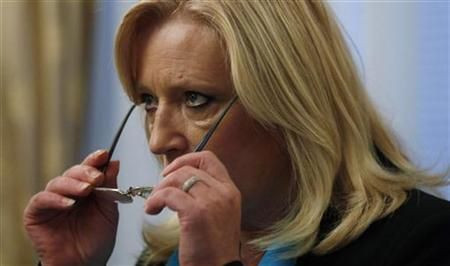Slovak Euro Fund Vote Hits Snag, Seen Eventually Passing

A Slovak ruling party said it would abstain on Tuesday from a vote on expanding the euro zone's EFSF rescue fund, forcing the government to turn to opposition parties to push through a deal agreed by the currency bloc to contain the Greek debt crisis.
Any further delays to the ratification of EFSF expansion, which requires the approval of all 17 euro zone governments, could unhinge markets already under pressure from signs that the crisis is spilling beyond Greece's borders.
With all other euro zone states having ratified the pact to boost the size and powers of the European Financial Stability Facility, Slovak Prime Minister Iveta Radicova put her government on the line by tying a vote in a session slated to begin at 1100 GMT to a confidence motion on her cabinet.
Even they lose the vote, she and two of her ruling coalition partners have vowed to push through the ratification by asking for the opposition's support. The leftist opposition party Smer hinted it would be receptive -- in exchange for major concessions including a cabinet reshuffle or early elections.
The fourth ruling party, Freedom and Solidarity (SaS), said it would abstain from the ballot. It argues that, as one of the poorest members of the single currency club, Slovakia should not pay for the debts racked up by more affluent countries.
We reject this pressure, and therefore will not take part in the vote, SaS Chairman Richard Sulik said.
If, as expected, Radicova loses the vote, parliament can submit the ratification to repeated ballots once she has struck a deal with former premier Robert Fico's Smer party, which said it was ready to discuss the matter.
OPPOSITION READY TO DO A DEAL
We are ready to talk to political parties seeking approval of the EFSF. But let's wait, this government is facing a test now, Fico told reporters.
While Slovakia has been dragging its feet on the EFSF approval, euro zone leaders have been discussing further action to prevent a spread of the euro zone debt crisis.
German Chancellor Angela Merkel and French President Nicolas Sarkozy said after talks on Sunday that they would unveil new measures in the coming weeks but gave few details.
Belgium won agreement by bank Dexia on the nationalization of its Belgian division on Monday and the Greek central bank effectively nationalized a small bank the same day.
Analysts said that while the Slovak brinkmanship would not torpedo the eventual expansion of the EFSF, it might weigh on global sentiment toward the euro zone as the crisis deepened.
The SaS should consider that it could trigger not just a collapse of the government, which is a secondary issue right now, but cause turbulence in Europe and on the markets, said Grigory Meseznikov, head of the Institute for Public Affairs.
The EFSF pact would increase its coffers to 440 billion euros ($600 billion), allow it to buy bonds from the market to support countries under attack by markets, bail out members who need funding and help them prop up failing banks.
Fico's Smer party supports the EFSF but said it would not vote for it on Tuesday, betting that discord within the governing coalition could give it a political opening.
It has demanded a government reshuffle or an early election in exchange for its votes, meaning that those coalition partners that support the EFSF can approach it at once for its backing, if the first vote on EFSF expansion fails.
Once the EFSF is voted in, deputies must then approve domestic legislation to implement the deal -- an issue analysts say should not pose a problem once Radicova secures support from either the SaS or the opposition.
© Copyright Thomson Reuters 2024. All rights reserved.





















